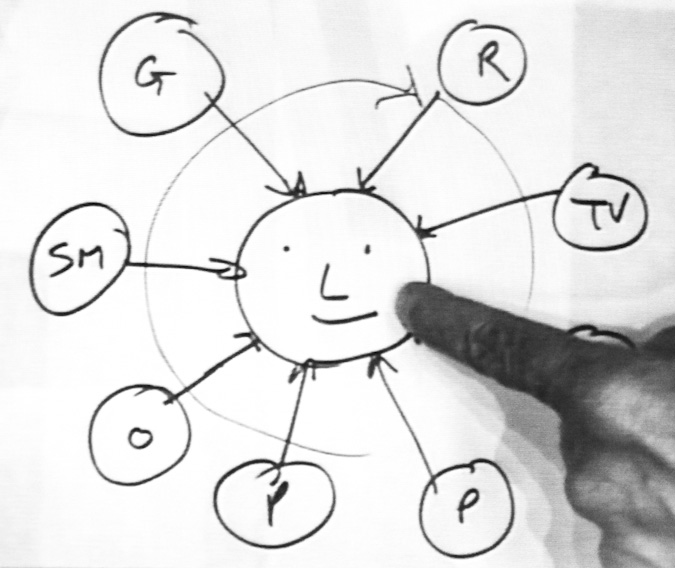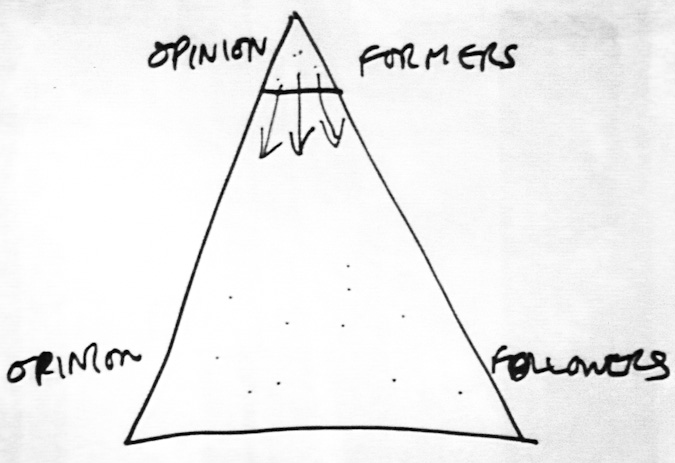Craig Charley
14 Sep 2012
Dave Trott - Predatory Thinking - BrightonSEO September 2012
Today we're at the 2nd BrightonSEO of 2012, blogging on all the topics that interest us!
First up we had a great talk from Dave Trott, but not before an opening video from Professor Puppet followed by a dancing Panda and Penguin (Kelvin was the penguin). Here's a picture of Kelvin - Post Penguin.
I'll admit that we were dreading the day being about link building, keywords and lots of boring SEO stuff that doesn't really mean anything anymore.
Instead, Dave Trott of CSTTG set the tone for the morning sessions - SEOs need to start learning from marketers and from other disciplines. Stop the silos, stop the SEO church (term used by Anthony Mayfield in the second talk) and start thinking about consumers, brand, business and taking tips from marketing tactics that have worked long before search engines existed.

Funnily enough, Dave only learnt what SEO was 5 minutes before he was due to speak, thinking it was the name of an organisation! But as he said, SEO is about beating your competitors, just like any other business.
“Whatever you do, you need to stand out."
The focus of Dave Trott's talk was how to separate ourselves from our competitors so you stand out from the crowd and don't get ignored.
Creativity
Creativity is the new buzzword – from creative thinking to creative football managers. But does anybody know what it actually means?

Dave Trott - BrightonSEO
Pure creativity and applied creativity are different. Pure creativity is what you find in art galleries: it doesn't do anything, but takes you forward in your thinking.
Then along come designers/ media who take that pure creativity and turn it into applied creativity. This is the wrong way round, and marketers should instead adopt the Bauhaus method of form over function.
90% of Marketing is Ignored
Apparently, 18 billion was spent on marketing last year but 90% wasn’t noticed, the same goes for SEO. So how do you get noticed?
Kill everybody else. Stand out from the 1000s of other messages.
The problem is that marketers (and SEOs) don't understand the media. They focus too much on the method of communication, or the channel, and not on the consumer. The consumer is the only part of the media that doesn’t change. ‘Viral’ has existed long before traditional media including radio; we need to focus on the consumer to go viral, not the channel. It doesn’t matter how to reach people as long as you reach them with the right message. Dave sums this up with the phrase ‘sh*t in, sh*t out’.

Target the consumer, not the channel
So what is the right message?
Impact, Communication, Persuasion
Complication is weakness, simplicity is strength. Go beyond complicated to get to simple. There are three steps to this: Impact, Communication, and Persuasion.
Dave’s way of explaining this was great: go try it when you’re back at home or in the office. If you want a cup of tea, you have to be simple: thinking about it won’t get you a cup of tea, speaking in Russian won’t get you a cup of tea.
Impact (“Cath”), Communication (“Cath, will you make me a cup of tea?”), Persuasion (“If you make me a cup of tea I’ll take the trash out”).
90% of advertising gets stuck at the first stage: impact – it doesn’t make it to communication. This is because everyone spends all their time talking about persuasion, but never get there.
If we get persuasion right, what chance has it got working is impact is missing? If we get impact right then even poorly thought out persuasion has a chance of working.

Get impact wrong, and persuasion doesn't matter
A good example of this is Facebook advertising – 1 billion people ignoring your ads isn’t any better than 100 people ignoring your ads, so unless it's converting, is it worth it?
Punters have selective perception – they make groups and patterns. The problem is that clients often want their message to be the same as competitors so they are grouped together.
If your product is the same as 19 other products then you only have a 5% share of voice as you are grouped with your competitors. Do something different, and you gain 50% of that share because you are in a different group to your competitors.

Do you want 5% or 50% share of voice?
How to Go Viral: Opinion Formers vs. Opinion Followers
Direct line spend £83 million per year on marketing, how do you compete with that on a budget of £5 million or £5000? How do you make budget work hard?
There are opinion formers and opinion followers – one person does most of the talking, others chip in. Opinion formers want to stand out, followers want to stay out of the spotlight.
With £83 million you can just target the opinion followers and enough messages will sink in and make you money. But the opportunity for lower budgets is opinion formers – each of these can create 2 dozen followers.

Target opinion followers and they will each influence a dozen others
Get noticed by the opinion formers, who will disseminate it down to the followers and you end up with a much larger reach. But if you want to reach opinion formers you can't target opinion followers, you have to do something out of the ordinary.
Create conversation fuel – be brave, be different.
Dave Trott's talk is increasingly relevant for SEO - 10 blue links are becoming a lot less valuable. You could rank 5th but if you have lots of rich snippets you get the clicks, and there are increasingly different and alternative ways to appear in search. Use Dave's logic to appear in those places and get your site in front of your customers.